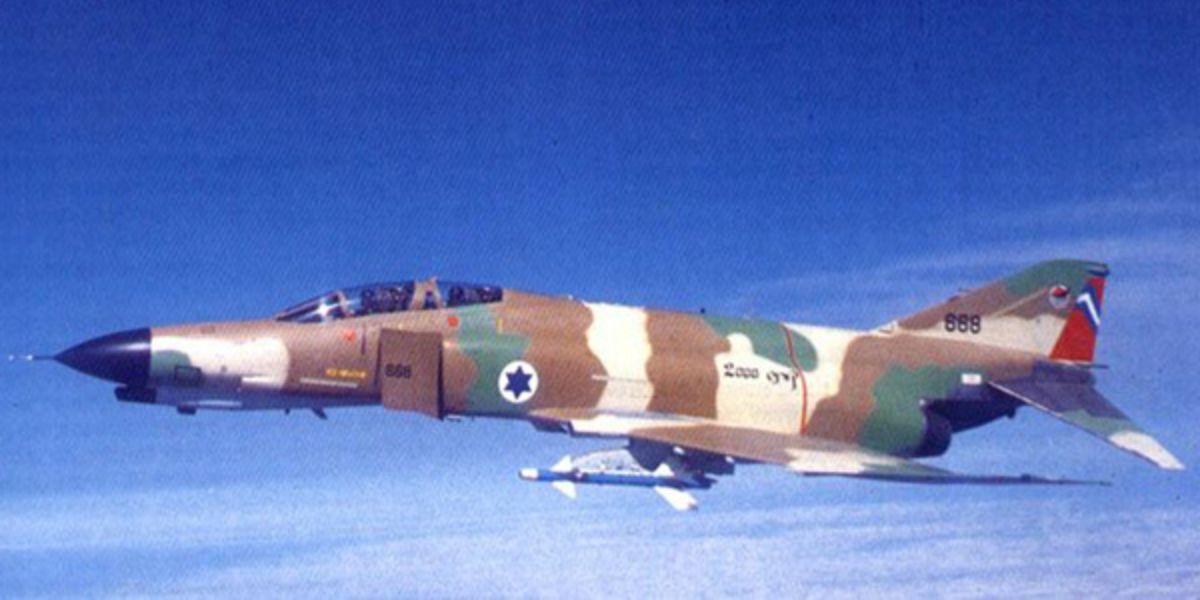The F-4 Kurnass
The Israeli Air Force (IAF) relied mostly on the Mirage III and Nesher delta fighters; therefore, the Phantom II was used primarily in its air-to-ground role, even though the American-manufactured F-4 was equally capable of performing both air-to-air and air-to-ground roles.
Since the Israel Defense Force (IDF) only had a limited presence in this area—mainly second-line units—protection from the air was prioritized during the night of October 6–7, 1973, in the sector extending from Ras Sudar to Ophir along the east coast of the Gulf of Suez during the Yom Kippur War. The Ras Sudar to Ophir region was extremely vulnerable to an Egyptian air or seaborne attack before the first-line reserve forces arrived.
During the first night of the war, Kurnass crews were left to defend the Ras Sudar to Ophir sector as the IAF’s nighttime interception force. From Day 1 to Day 2, CAP crews were stationed over the Ras Sudar to Ophir sector by Squadron 107, the fourth Israel Air Force (IAF) Kurnass Squadron. This squadron had previously defended Ophir at noon and Ras Sudar at dusk. In the book Ghosts of Atonement, Israeli F-4 Phantom Operations during the Yom Kippur War, written by Shlomo Aloni, Kurnass navigator Micha Oren recalled:

Attacking an Egyptian ship with an AIM-7 Sparrow
“We flew a CAP over the Gulf of Suez when we were ordered to attack an Egyptian ship that shelled Ophir. Trouble was, we were in air-to-air configuration and had no bombs. We flew there—scary pitch-black night—and we saw the ship shelling. What kind of ship was it? Was it armed with SAM? Nobody knew.
“We hesitated to get closer, but then I remembered that I once read in Aviation Week that during the Vietnam War, Americans utilized an AIM-7 to sink a ship. The aircraft was armed with Lavid [IAF name for AIM-7 Sparrow, pronounced la-vid, translation: Plywood], so I suggested to Gordon that we give it a shot.
“We leveled at 20,000 feet and dropped the nose down. Over land, echo from the ground would have blinded radar, but over sea, the returned echo was weaker and we acquired the ship on our radar screen. I was afraid the missile would home on the echo of the sea so I planned dive angle and speed in such a way that the missile would lock onto the ship. We flew two or three practice passes, decided that we were ready, then entered another pass and launched a missile.
The missile hits the water
“The missile hit the water some ten to fifteen miles from the ship; maybe we scared a shark, but the ship panicked, or maybe not, and turned away, so we felt like heroes—like a dog chasing a running cat—and started to pursue the ship, strafing it from long range.
“While we were playing with the ship, RCU notified us that an unidentified radar contact was crossing the Gulf of Suez from west to east, in the north sector of the gulf. We rushed over there really quick and I managed to spot on radar an echo of a slow-flying object: a light aircraft or a helicopter. I requested permission to open fire, but RCU hesitated and by the time permission was granted, the flying object had completed the crossing of the Gulf of Suez and entered Sinai.
“For as long as it flew over water, we had a fair chance to shoot it down, but once it was over land, the prospects of a successful interception were slim. Still, somehow I managed to accomplish a radar lock and we flew five, maybe six passes, but during all passes the missile did not launch; luckily for all involved because it was an Israeli helicopter.”
Ghosts of Atonement, Israeli F-4 Phantom Operations during the Yom Kippur War is published by Schiffer Publishing and is available to order here.
Photo by Israeli Air Force, Bukvoed and AHMED XIV own work via Wikipedia

